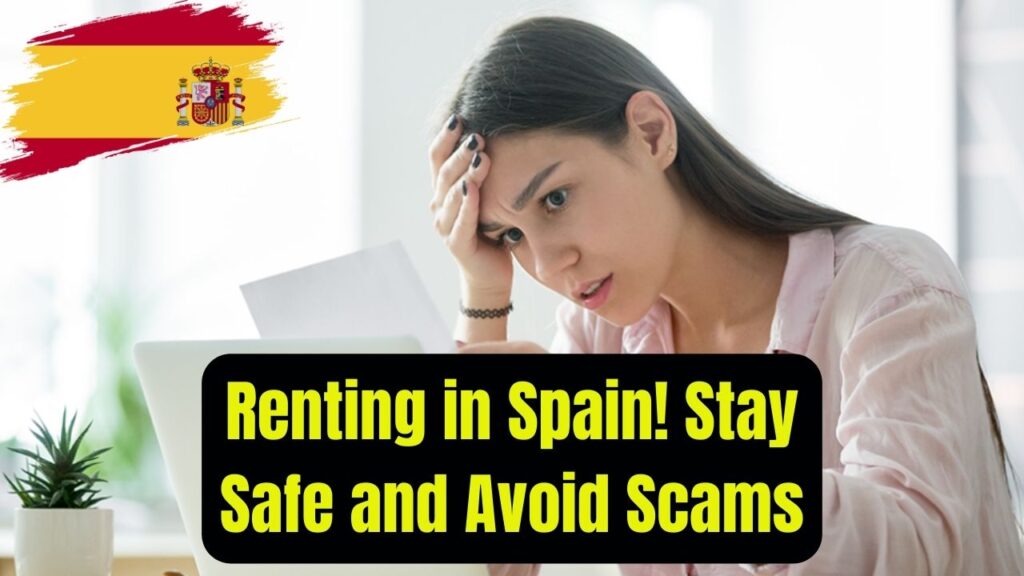
Renting Safely in Spain: Renting a property in Spain can be an exciting adventure. Whether you’re moving for work, vacation, or a long-term stay, Spain offers beautiful locations, a fantastic lifestyle, and vibrant culture. However, like in many other popular tourist destinations, the rental market in Spain is not without its risks. Scammers often target unsuspecting renters, and navigating the system can be tricky if you’re unfamiliar with the potential pitfalls.
This ultimate guide will provide you with all the tools and knowledge you need to rent safely in Spain and avoid scams lurking online. With practical advice, real examples, and expert insights, you’ll be well-equipped to tackle the Spanish rental market and secure a legitimate, safe rental property.
The Ultimate Guide to Renting Safely in Spain
| Key Data | Details |
|---|---|
| Most Common Scam Types | Fake listings, pressure to act quickly, upfront payments |
| Recommended Rental Websites | Idealista, Fotocasa, Habitaclia |
| Legitimate Verification Methods | Request property ownership documents, avoid off-platform communication |
| Deposit Expectations | Never pay deposits without seeing the property first |
| Report Scams to | Guardia Civil (Spanish National Police) |
Renting a property in Spain can be an exciting and rewarding experience, but it’s essential to stay vigilant and be aware of potential scams. By following the tips and strategies outlined in this guide—such as using reputable websites, verifying property ownership, and avoiding high-pressure tactics—you can greatly reduce the risk of falling victim to fraud. Renting safely in Spain is possible with the right knowledge and precautions, allowing you to enjoy your new home or vacation without worry.
Why Renting Safely in Spain is Crucial
Spain’s rental market is diverse, with options ranging from short-term vacation rentals to long-term residential leases. According to the Spanish National Institute of Statistics (INE), more than 50% of Spaniards live in rental properties, reflecting a highly active rental market. While this provides many opportunities for newcomers, it also opens the door to fraudulent practices.
Rental scams can take many forms, from fake listings that don’t exist, to bait-and-switch tactics where the advertised property doesn’t match the one shown to potential tenants. Additionally, scams often involve overly attractive prices or pressure to act quickly, demanding upfront payments with little to no paperwork.
Being aware of these risks and knowing how to avoid them can help you navigate the market confidently.
Understanding Common Rental Scams in Spain
1. Fake Listings
One of the most common scams is the “fake listing.” Scammers often post photos and descriptions of properties that either don’t exist or are vastly different from what is shown online. They may use attractive images (sometimes stolen from other websites) or even use artificially enhanced photos to make a property look more appealing.
Example: You find a beautiful apartment listed for rent on an online platform with stunning photos. The price seems too good to be true, and the listing includes a brief description but no direct contact details. The “landlord” insists you pay a deposit immediately, but when you arrive, the property either doesn’t exist, or the actual apartment is much worse than the photos.
2. Bait-and-Switch
In this scam, the property shown online is not the same as the one you see in person. The scammer may offer a “more affordable” or “better” place than what is actually available, hoping that you’ll still rent from them once you arrive.
Example: A lovely beachfront property is listed, but when you arrive, the apartment is not by the beach at all, and it’s in a completely different area. The scammer might claim that another tenant canceled, but the unit they show you is nothing like the one in the ad.
3. Unbelievably Low Prices
If a property is listed for a price much lower than comparable listings in the area, there’s a strong chance it’s a scam. Scammers often use below-market prices to quickly attract renters and encourage immediate action without proper research.
Example: You find a spacious flat in Madrid for half the price of similar listings. The owner says it’s a “special deal” and asks for a deposit to secure the place. When you arrive, the property is either unavailable or in poor condition.
4. Pressure to Act Quickly
Scammers often create a false sense of urgency by saying there are other interested renters or that the offer is only available for a limited time. They will press you to sign a lease or send money without giving you time to think it over.
Example: A “landlord” emails you saying, “This property won’t last long, we have several others looking at it. Send a deposit today to secure it!” This high-pressure tactic is a red flag.
5. Requests for Upfront Payments
Legitimate landlords typically require a deposit only after you’ve seen the property and signed a rental agreement. Be very cautious if someone demands an upfront payment without providing proper documentation or contract.
Example: You are told to send a bank transfer or deposit a large sum of money before you’ve even seen the property, under the excuse that they’re “holding” it for you. This is often a scam to steal your money.
How to Protect Yourself from Scams
1. Use Reputable Rental Websites
When renting a property in Spain, always use well-known, reputable websites. Sites like Idealista, Fotocasa, and Habitaclia vet listings more thoroughly, reducing the chances of encountering fraudulent ads.
2. Verify Property Ownership
Ask for official documents to verify that the person offering the rental property is the actual owner. In Spain, you can request a “nota simple” from the property registry, which shows the legal ownership of the property.
Tip: If a landlord is reluctant to provide verification or only wants to communicate via phone or off-platform methods, it’s a major red flag.
3. Avoid Off-Platform Communication
Be cautious if the landlord or agent insists on moving communication off the platform or outside of official channels like email. Scammers often try to avoid being traced by moving conversations to apps like WhatsApp.
4. Inspect the Property in Person
Never agree to rent a property without visiting it first. While it may seem convenient to handle everything online, seeing the place in person gives you a chance to confirm the property’s condition and location.
Tip: If you cannot visit the property, ask a trusted person or local representative to inspect it for you.
5. Use Secure Payment Methods
Avoid cash payments or wiring money to an unfamiliar account. Use secure payment options such as credit cards or official bank transfers that offer a traceable record. Never send money via non-traditional methods like Western Union.
Understanding the Spanish Rental Market: Key Insights
1. Short-Term vs. Long-Term Rentals
Spain has a distinct market for both short-term and long-term rentals. Short-term rentals are often found on platforms like Airbnb, whereas long-term rentals are usually listed on Idealista, Fotocasa, and other real estate sites. Understanding these markets is crucial as each has different rules and regulations:
- Short-term rentals: Ideal for vacations or temporary stays. These are often less regulated and require less documentation.
- Long-term rentals: Typically involve more paperwork, including contracts that outline your rights as a tenant, such as length of stay, rent increases, and maintenance responsibilities.
2. Rental Contract Essentials
In Spain, rental contracts are typically written agreements that clearly outline the terms of the rental, including:
- Duration of the lease (usually one year or more for long-term rentals)
- Rent payment schedule (monthly, quarterly, etc.)
- Deposit requirements (usually one to two months’ rent)
- Utilities (clarifies whether utilities like water, gas, or electricity are included in the rent)
It’s crucial to read through the contract carefully before signing. If there’s something you don’t understand, seek legal advice.
What to Do If You Suspect a Scam
If you’ve found yourself in a suspicious situation or suspect a scam, it’s important to act quickly. Here are some steps you can take:
- Discontinue Communication: Stop all communication with the suspected scammer immediately.
- Gather Documentation: Keep records of emails, messages, or advertisements related to the listing.
- Report the Scam: In Spain, you can report scams to the Guardia Civil, the national police force, via their website.
- Alert the Platform: If the scam occurred on a rental website, report it so they can remove the listing and prevent others from falling victim.
- Consult Legal Advice: Seek professional legal advice to understand your rights and how to proceed.
- Contact Your Bank: If you made any payments, contact your bank immediately to see if they can reverse the transaction or assist in recovering the funds.
Frequently Asked Questions (FAQs)
1. How can I tell if a rental listing is a scam?
Look for signs like too-good-to-be-true prices, vague descriptions, and the absence of direct contact information. If the landlord pressures you to make a quick decision or demands upfront payments, it’s likely a scam.
2. Are there any legal protections for renters in Spain?
Yes, Spain has strong tenant protection laws. Landlords must follow specific legal procedures, including providing a written rental contract and ensuring the property meets certain standards. Be sure to read up on the Ley de Arrendamientos Urbanos (Urban Lease Law) for full details.
3. Can I rent a property in Spain without visiting it first?
It’s possible, but it’s highly risky. If you can’t visit, ask a trusted person to inspect the property or use a local agent to verify the property’s legitimacy.











